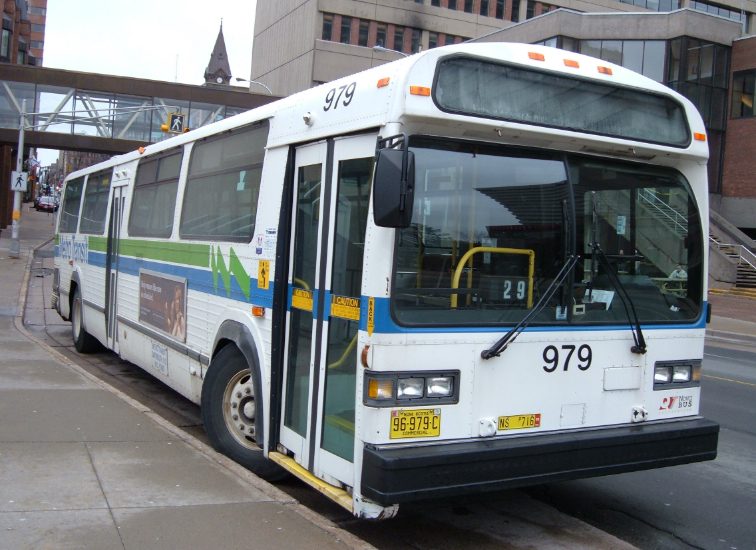KJIPUKTUK (Halifax) – People on social assistance and their advocates have long complained that getting Community Services to support their transportation needs is becoming more difficult by the year.
So far evidence has mostly been anecdotal. Now a presentation by senior bureaucrats at the Community Services Standing Committee backs up this claim.

In 2015/16 7% fewer people received social assistance than in 2013/14. But in that same period Community Services’ budgets for bus and taxi fares decreased from $10.9 million to $9.3 million, which is 15% less.
Special diet and telephone spending aligned more closely with the general decrease in the number of recipients.
Budget numbers were included in a January 10 presentation by Community Services deputy minister Lynn Hartwell, and Brandon Grant, executive director for the Employment Support and Income Assistance (ESIA) program.
Community Services offers transportation support only in case of medical needs and for work and training-related reasons. The department typically provides single bus tickets for each medical trip. In 2015/16 38 percent of cases received transportation supports.
The reason for the decrease was not explained. “There has been a decline in terms of the medical transportation that we see in 2015-16 partially offset by the decline in caseload, as well as other matters,” said Grant.
It should be noted that the experimental $39 discount bus pass offered to a limited number of Halifax residents on low income still represents an insurmountable cost to most people on welfare.
To give all adults on social assistance a bus pass would cost $11.1 million, Grant told the MLAs.
To put this amount in perspective, $11 million is one percent of the department’s overall budget, and 0.1 percent of all of of government’s expenses this year.
Of course, in much of rural Nova Scotia there are no buses, but there are always taxis, and additional support for transportation would offer welcome relief for many rural poor living in isolation regardless.
See also: Calgary to offer a $5 bus pass for its poorest residents. What about Halifax?
Please support the Nova Scotia Advocate so that it can continue to cover issues such as poverty, racism, exclusion, workers’ rights and the environment in Nova Scotia.




It should also be noted the half-price low-income transit pass is not available to anyone who receives a transportation subsidy from DCS.
And yet Minister Bernard promised to restore the special needs, so called (“so called” because there’s nothing special about the need to get around, the need for a telephone, or food) that had been cut when she took office in 2013. “Those decisions were not well thought out and they will be reversed,” she said. Three years on, things are worse than ever for those who must submit to the tender mercies of income assistance. Ironically enough (for a government department so consumed by obsession with cost), it has bee shown repeatedly through various studies and reports from such varied sources as the CCPA and the Nova Scotia Association of Social Workers (for example), as well as anecdotal evidence, that social inclusion results in better mental and physical health. Which ultimately results in savings immediately and down the road. Volunteering is also a grounds for retention of one’s bus pass, and no, contrary to what might be claimed by some case workers, there is nothing (currently) in the infamous Policy Manual OR the ESIA Act or Regulations that qualify in any manner or prohibit that ground. If you read the relevent section, it merely lists volunteering as one amongst a few grounds. There is also no clause, sentence, or section (as of this time of writing) in the aforementioned documents that sets a specific number of medical visits, of whatever description, that must be met before qualifying for said bus pass. The Act and the Regs are paramount, over-riding the case-workers, supervisors, and the Manual. There is a very good interview with Dr. Fiona Traynor of Dalhousie Legal Aid from May 2015.
http://www.cbc.ca/…/Ra…/Local+Shows/Maritimes/ID/2666610170/
There is also wording to the effect, though I cannot recall it just now, that appears to give the Minister, and indeed those labouring within the Department, some “wiggle room” for compassion should they choose to exercise it. I understand financial caution, I do not understand cheeseparing and a refusal to accept both new facts as they are made known, and that we are very much indeed our brother’s keeper.
Some excerpts from Fiona’s interview with Information Morning, as mentioned in my previous comment:
“…requires a very selective reading of the law…not upheld in the law…negatively affecting lives…good to have a wider context around this issue…no backing up with numbers of any sort…no consultation…Drs. tired of wasting their time and the public money on writing successive letters to prove that a person has a disability…they’re using so many public funds to fight what should be just a basic kind of assistance for people…”
Just a reminder that in rural areas there are NOT ALWAYS taxis available and low income people who live outside of rural towns have no options for transportation. If you live outside of Annapolis Royal and have a regular medical appointment in Halifax or Yarmouth, you would be hard pressed to get $150 for transportation more then 2 or 3 months in a row. I’ve had friends whose transportation funds were cut off with no notice and they were desperate to find a way to their appointments.
I am a person on disability, not by choice, but because the Government in all their wisdom thought it was ok for a 90 year old man to be behind the wheel of a car. I am not on welfare because i don’t want to work, I am on DISABILITY, not able to work. When they made it a one tier system, that was one of the biggest mistakes ever made. Also the government allows the power to go up yet doesn’t add to the checks to cover the raise they allowed. And now they want to take our transportation away. The money they give 2 people for rent and power is only 570, yet we pay 60 for power alone and 750 for rent, because this is 2018 and owners of buildings are allowed to raise the rent to what they want regardless the state of the building and its age. This is 2018 Government, time to join us in this year and leave the 1970 and their prices behind and I refuse as a 53 year old woman to live in an area where i do not feel safe and cannot defend herself if attacked because the government thinks the block or the square is a safe area to live without fear. We were in danger years ago and our worker would not do an immediate relocation for our safety, which is in the handbook, and we ended up losing over 15, 000 dollars worth of items some unreplaceable. I worked since I was 16 and earned my things over the years, what right does the government have to tell me to downsize and sell off some of my things, so there would be less to move and would cost less for movers, which they have yet to raise in over 20 years. I could go on and on, but I won’t, but I would love to see some of these government bigwigs try to live off what we are and see how they handle it and do not go running to family or friends for help. THEY WOULDN’T MAKE IT!!!!!!!!